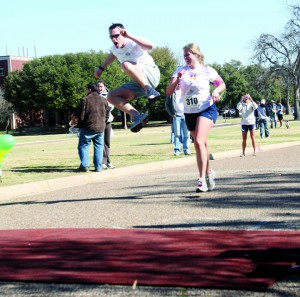
Students competing in the 2009 Bearathon celebrate as they cross the finish line. The 2011 Bearathon will take place on March 19.
By Leigh Ann Henry
Reporter
Running tends to be thought of as a “green sport” as there are no obvious detriments to the environment.
But marathons are different. In a marathon, thousands of paper cups are thrown into the street throughout the race, leaving behind a wake of litter.
In an attempt to combat such waste, on March 19 Baylor Student Foundation will host the ninth annual Bearathon and for the first time it will be cup-free.
Bearathon is a 13.1 mile half-marathon spanning between Baylor, Cameron Park and downtown Waco and has been labeled “the toughest half-marathon in Texas.”
Almost 1,400 participants signed up for the 2010 Bearathon, which was canceled due to inclement weather.
A cup-free Bearathon will save more than 28,000 paper cups from littering Waco streets and landfills.
HydraPour is a hydration system allowing for a cup-free race and was introduced in 2009 at the Road Race Management Conference in Florida.
The system requires runners to carry their own method of hydration (the new HydraPouch is suggested). As runners navigate the course, designated fill stations equipped with a HydraPour dispenser allow runners to press their container against it and fill their cup quickly without slowing down.
“Bearathon being cup-free is such an awesome thing. It has a positive impact on the environment and a positive impact on Baylor students since the money earned goes toward scholarships,” Michael Horne, co-race director for Bearathon, said.
Race organizers had planned to implement the Hydrapour system in 2010, but the canceling of the race meant the eco-friendly solution could not be tested.
The cup-free racing technique was first applied in July 2009 at the Liberty Run in Colorado.
Lizzy Davis, director of Student Foundation, said the goal is not only to keep streets clean and avoid filling landfills, but also to help teach runners better habits they can use in other races.
A lot of the largest marathons in the country, such as the New York City or Boston Marathon, have begun using the HydraPour system, but having almost 50,000 runners makes the application of an entirely cup-free race a distant dream.
The inventors of the system say they hope runners who learn these habits and begin using the system are more apt to apply eco-friendly methods at other marathons.
In addition to the hydration method, Student Foundation will also be collecting used running shoes for donation to charities, such as One World Running and Nike’s Reuse-A-Shoe program.
One World Running is an organization that donates the shoes to those in need both within the country and around the world.
Davis said by the time a runner finishes a marathon, typically running shoes have reached their maximum mileage, rendering the shoes useless for another marathon but optimum for charitable donations.
If the shoes are no longer usable, they are sent to the Nike recycling center and submitted to the Reuse-A-Shoe program. The shoes are then destroyed and salvaged to be used in courts, tracks, fields and playgrounds.
Race directors are encouraging runners to bring an extra pair of shoes and donate the used pair to these organizations.
These donations have been encouraged in the past and last year more than 50 pairs of shoes were donated.
To further encourage sustainability, local farmers will provide locally grown fruits and vegetables at the race for participants.
The event is the largest fundraiser that Student Foundation shoulders each year. The proceeds from Bearathon are funneled back to Baylor in the form of scholarships. Although the race was canceled last year, race registration fees were not refunded. Proceeds totaled nearly $20,000 in scholarships, which aids about 100 students.






